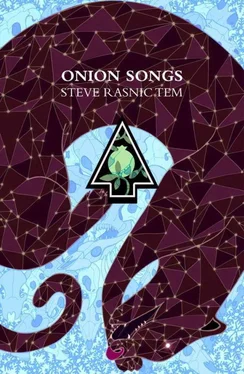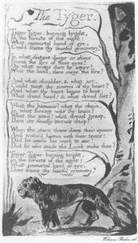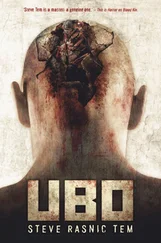The green dog howled then, in that mournful way of dogs and men. Some would say it was a sadness without much legitimacy, since no tragedy had occurred, no painful injury. It was the sadness of the human being living his human life. It was the sadness of the shape-changer.
The dog was lucky in another way: he wasn’t plagued by a man’s ambition. His flanks and belly were crusted with scars, including the vague crease from a human appendectomy. He’d sacrificed a testicle in a losing battle with a garbage truck. And now he was content to roll around on his back with his diminished genitals in the air, inordinately proud of what others considered a warped and sorry bit of punctuation. The man still in him identified it as a semi-colon. Used to join two main clauses, and between coordinate elements containing commas, to indicate a subtle variation of voice; the semi-colon was by far the man’s favorite punctuation mark. The fact that the man had a favorite punctuation mark spoke volumes about who he had become.
* * *
Sometimes the green dog saw the man it had been out in the street, or wading through the tall grass staring at his feet, as if having lost something very important, as if having lost his mind to the green dog. The man was lost, or puzzled, and these were things the green dog understood because it had often been lost or puzzled. How the green dog could still see the man it used to be did not puzzle it, because this was a man and the green dog was a dog who had left the concerns of a man behind.
The green dog sensed it should probably stay away from the man, but it could not. It was drawn to the man by forces as basic and compelling as its need to eat and get rid of what it had eaten, both as pleasurable as they were necessary. So one night it showed up at the man’s back door after the day went dark, and sang the universal sadness that even the man could understand. The man brought a bowl of something to the back door and laid it down for the green dog to eat, and the green dog ate what was in the bowl without bothering to smell it first, because it trusted the man it used to be.
And so the green dog came to feed each night at the house of the man it had been when it moved upright through the world. Although the food the man served was edible, something was not quite right about it. Sometimes the man cooked the food with the paper still wrapped around it; the dog ate the burned paper, too, which tasted quite good. Sometimes the man didn’t cook the food at all, which was fine with the green dog, even though it somehow knew this wasn’t so fine as far as the man was concerned.
* * *
Finally one night the dog came for supper and the man came to the back door without a bowl in his hand. The man opened the screen door and held it as the green dog readily trotted inside. “Here,” the man said, gesturing around the kitchen. For a moment the dog was confused, thinking it must be daylight again and this a garbage heap—it had that very smell, that very appearance. The dog looked up at the man. “Don’t look so stupid!” the man shouted. “Help yourself!” And after a brief, sad and nervous time, the dog did what the man said.
The man himself ate very little in the days that followed. Sometimes he would sit down on the floor with the dog and put a plate no cleaner than the dog’s bowl on the floor in front of him. Sometimes he would stick his fingers into the food, bring them into his mouth and suck on them loudly. The dog was hungry even though all it really wanted to do was watch the man.
But most of the time the man did not eat. Most of the time the man stared at the food, and spoke words at the food, but did not eat the food. Out of respect the dog held back from its own food as long as it could, but eventually of course it ate because it had the honesty of a dog, which compels it to eat when it is hungry, to rest when it is tired, to bark and to howl and to make any noise possible with its particular vocal chords when it feels whatever it is destined to feel. And to ignore what it sees in the mirror.
The man, on the other hand, had lied so long to himself and to others he could no longer tell if he was tired or hungry or in some sad and lonely state with the best part of him residing in this ugly green dog of the solitary testicle.
* * *
Eventually the man fell ill. The green dog had been expecting this, because even a dog understands that everything must eat in order to live, just as it must breathe and drink and move through the world with others of its kind. These are things that even a green dog knows.
The man who was the green dog before there even was a green dog became so ill he slept most of the time, and when he could get up he managed only to sit without moving in the large brown chair. The green dog didn’t like the large brown chair because it faced a mirror. A snippet of leftover man-thought flitted through the dog-consciousness: mirrors pretended to show everything, but in fact showed very little.
How strange to think another thing’s thoughts, thoughts it had no hope of understanding.
Even though the man himself seemed to have no liking for mirrors he sat watching the man in the mirror for days at a time. Eventually he did not return to his bed at all but sat in the brown chair day after day, watching the man in the mirror carefully, as if waiting for something sad or awful to happen.
When the awful thing happened, the green dog howled. Then it went into the kitchen to relieve itself and look for more food.
* * *
How strange to wake up as someone else then wake up as someone else again.
The man in the brown chair who had become a green dog had no strength left for walking or lifting or even eating, but he did have strength enough to recognize the man in the mirror for what he was: dust and reflection, lost skin cells and idle fantasy molded by shadow, a compendium of every person he’d had any stray urge to be.
And as the man in the brown chair declined, becoming less like a man and more like a piece of badly worn furniture, he came to understand that the man in the mirror was far more than he had ever been. He came to understand that he had given the man in the mirror the best he had dreamed and hoped for, and consequently the man in the mirror—although completely imaginary and not much heavier than a dying breath—was far more alive than the man in his sagging saddle of furniture, in fact was far more alive than this man had been at the best of times.
This is not to say that the man was overcome with any kind of sadness or regret. He had led what he considered an interesting life. He’d had a family who cared what happened to him and he’d had a career better than some. And a wife who had loved him so much that each day it was yet another surprise for this man who had grown up without the expectation of love.
The fact that the man in the mirror was so much more was undeniable, and unchangeable. The man could accept this because he felt he had no choice in the matter. Certainly none of us could ever be as fully realized, as complete, as our imaginary selves. And now at the end of his life he could think of nothing better to do than to gaze at his better self as first breath, then imagination, left his body.
* * *
The man in the mirror felt only the vaguest connection with the old man slumped over in his ratty brown chair. He gazed at the dead man much as he might have looked at a somber photograph, one he had seen perhaps too many times.
In fact, the only interesting thing to happen in this particular view was when an ancient green dog occasionally wandered over to the dead man to lick his fingers and howl. For some reason, this vaguely amused the man in the mirror but he suppressed his chuckles, not wanting to startle the dog from the room. Eventually his patience was rewarded and the dog stared through the mirror into the mirror man’s eyes. Which froze the dog in terror. Which made the man in the mirror smile.
Читать дальше












